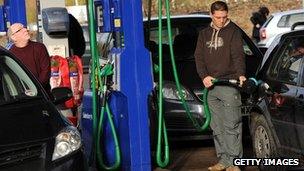'Big drop' in UK petrol stations as fuel reserves fall
- Published

The number of petrol stations has been falling for 40 years but the report says there is plenty of supply
The number of petrol stations has plummeted since 1970, says a government study, external, while fuel reserves have dropped by a fifth over the last 10 years.
The Department of Energy and Climate Change (DECC) says the UK still has "more than enough capacity" to withstand future fuel shortages.
It said 92% of all UK postcode areas have more than two petrol stations less than 10 minutes away.
But the AA warned that the fuel network is still susceptible to "panic buying".
The number of petrol forecourts has fallen from 37,500 in 1970 to 9,000 in 2011, while the UK's diesel and petrol reserves have dropped to six-to-eight days, down by two days compared with 10 years ago.
The AA's Luke Bosdet told the BBC: "The vast majority of motorists have access to fuel; the big problem is how much they are being charged for it.
"But the network is still susceptible to breakdown when there is panic buying."
The Petrol Retailers' Association (PRA), which represents the UK's independent forecourt retailers, said: "The report indisputably confirms that the majority of fuel forecourts are running with dangerously low levels of stock and that the continued closure of forecourts is reducing onsite storage capacity across the country."
Supermarkets now own 15% of all forecourts but account for 39% of total fuel volumes, the report said, leading to the demise of many independent petrol retailers.
Tesco recently overtook oil giant BP as the UK's largest fuel retailer by volume.
The Office of Fair Trading is currently gathering evidence about the fuel supply market, estimated to be worth £47bn a year, and will report its findings in January.
The watchdog is considering whether falling costs of crude oil are reflected in prices paid by motorists.
Pressure
Fears are growing that fewer petrol stations, lower reserves and a rise in the number of cars on the road from 27 million to 35 million over the last 15 years, is putting too much pressure on the fuel supply network.
The AA says that the industry's "just in time" delivery business model is leaving it exposed to supply shortages in the future.
Earlier this year, Cabinet Minister Francis Maude advised drivers to fill up their tanks and store extra fuel in a jerrycan to prepare for a possible strike by fuel tanker drivers. Demand shot up, leading to queues and shortages at some petrol stations.
"The experience from March 2012 showed us that many stations don't fill their tanks because it is too expensive to do so," said Mr Bosdet.
But the DECC report, compiled by consultants Deloitte, concluded that UK retail sector had "more than enough capacity to meet fuel supply shocks until contingency measures can be put in place".
Energy Minister John Hayes said: "This report was commissioned by my department to get an accurate picture of the retail fuel market and to consider any possible implications for our security of supply.
"Although it is very clear there has been a market shift from independent to supermarket forecourts in the past 40 years this has not had an impact on the vast majority of motorists."
- Published5 December 2012
- Published3 October 2012
- Published5 September 2012